Texas Book Festival set to honor novelist Elizabeth Crook with the 2023 Texas Writer Award
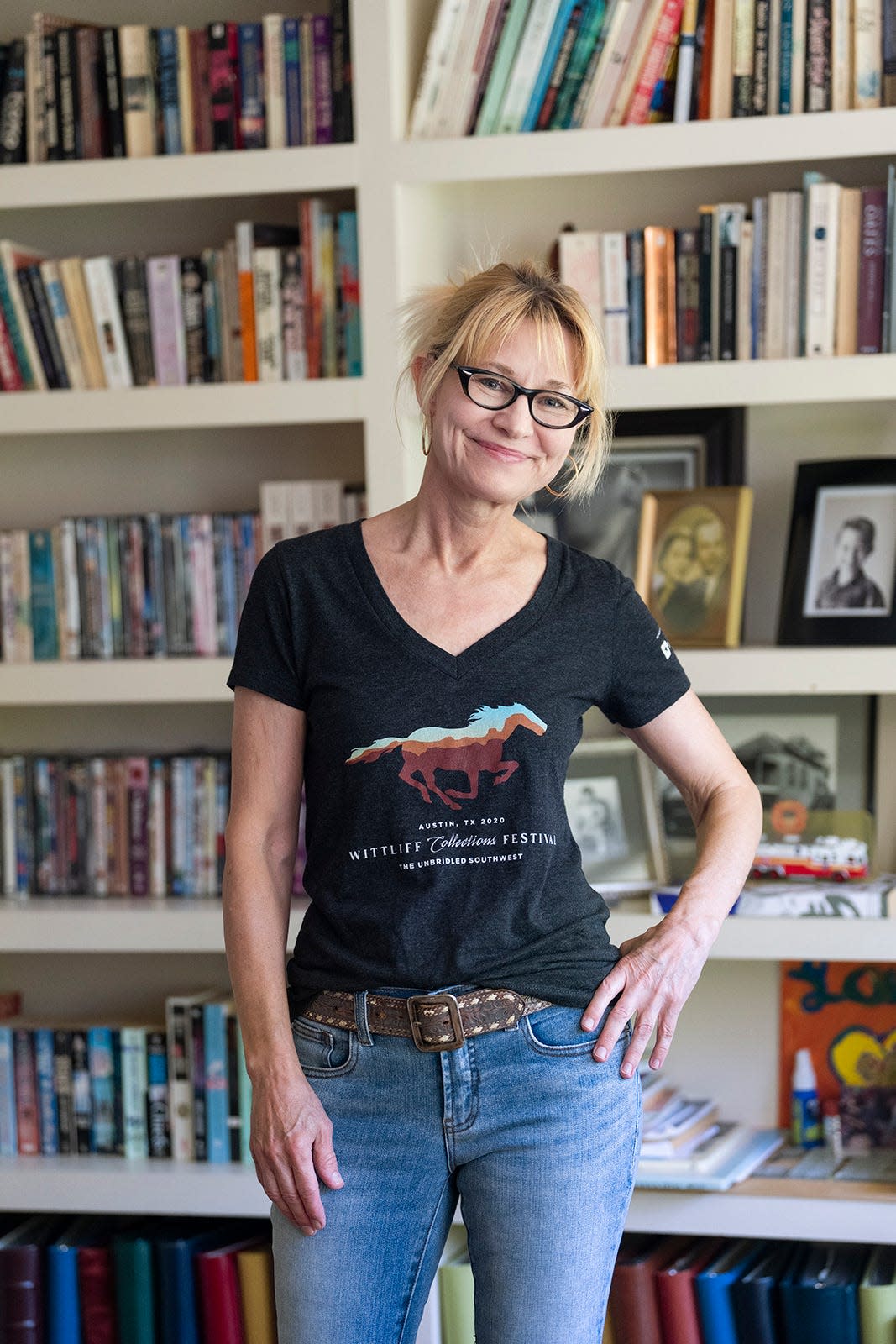
It is an accolade long overdue: At a gala dinner on Nov. 9, the Texas Book Festival is set to honor novelist Elizabeth Crook with the 2023 Texas Writer Award.
While she'll make remarks at that dinner, two days later at 12:15 p.m. Nov. 11 in the Capitol Auditorium, Crook, offspring of a famous Texas family, will receive the award's tangible honor, a pair of custom-made boots.
At that event, free to the public, author and journalist Stephen Harrigan will discuss her latest book, "The Madstone." On Nov. 7, before the festival events, Crook will sign copies of "The Madstone" at BookPeople.
Since 1991, Crook has written six meticulously researched and crafted historical novels all related directly to Texas. Each was brought out by a major publishing house. All were acclaimed. Several have been honored with book awards.
And for more than 30 years, Crook's fans have waited eagerly for each subsequent novel.
They must wonder, too, why it took so long for the state's book festival to recognize her in this way.
In rare bookish company
Crook is very much a part of the Austin literary scene, and each big Texas city nourishes a singular bookish community.
Among the richest these days is in El Paso, which stands alone in its desert-and-mountain fastness, and is linked more closely to Mexico, New Mexico and even California than it is, say, to Houston, Dallas-Fort Worth or San Antonio.
For its part, Austin's literary community has been sustained by its universities, major research libraries, groups such as Texas State Historical Association and Humanities Texas, several statewide media outlets, a long history of book and magazine publishing, and a café society that allows literary types to mingle easily.
And let's not forget the Texas Book Festival, which draws authors from all over the world and also serves as a giant reunion for the state's writers.
More: Texas history: On second thought, make that 60 essential books about our state
Easy-going, gracious and even a bit shy, Crook has made fast friends in this community. One set of books in her book-filled house is devoted exclusively to volumes written by people she knows personally.
It is right to rank Crook among the city's best living authors, a list that might include Stephen Harrigan, Sarah Bird, Lawrence Wright, Oscar Cáseres, Jesse Sublett, Carrie Fountain, Mike Judge and others.
The Texas Writer Award, established in 1999, comes to Crook at a good time, since her new book, "The Madstone," a sequel to her thrilling "Every Which Way Tree," is just out.
Early on, the honor went to the state's long-established literary figures — almost all male, almost all Anglo — such as Horton Foote, John Graves, Bud Shrake, Robert Caro, Elmer Kelton, Bill Wittliff, Larry L. King, T.R. Fehrenbach and Cormac McCarthy. Other early honorees were people who valiantly supported writing in Texas: Evan Smith, Mike Levy and Mary Margaret Farabee, among others.
Recent winners have brought the awards more up to date: Elizabeth McCracken, Don Tate, Attica Locke, Pat Mora, Dagoberto Gilb, Sarah Bird and others. Like Crook's laurels, a few arrived tardily. For instance, Harrigan, Wright and Steven Weinberg were among those not recognized until well into the 21st century.
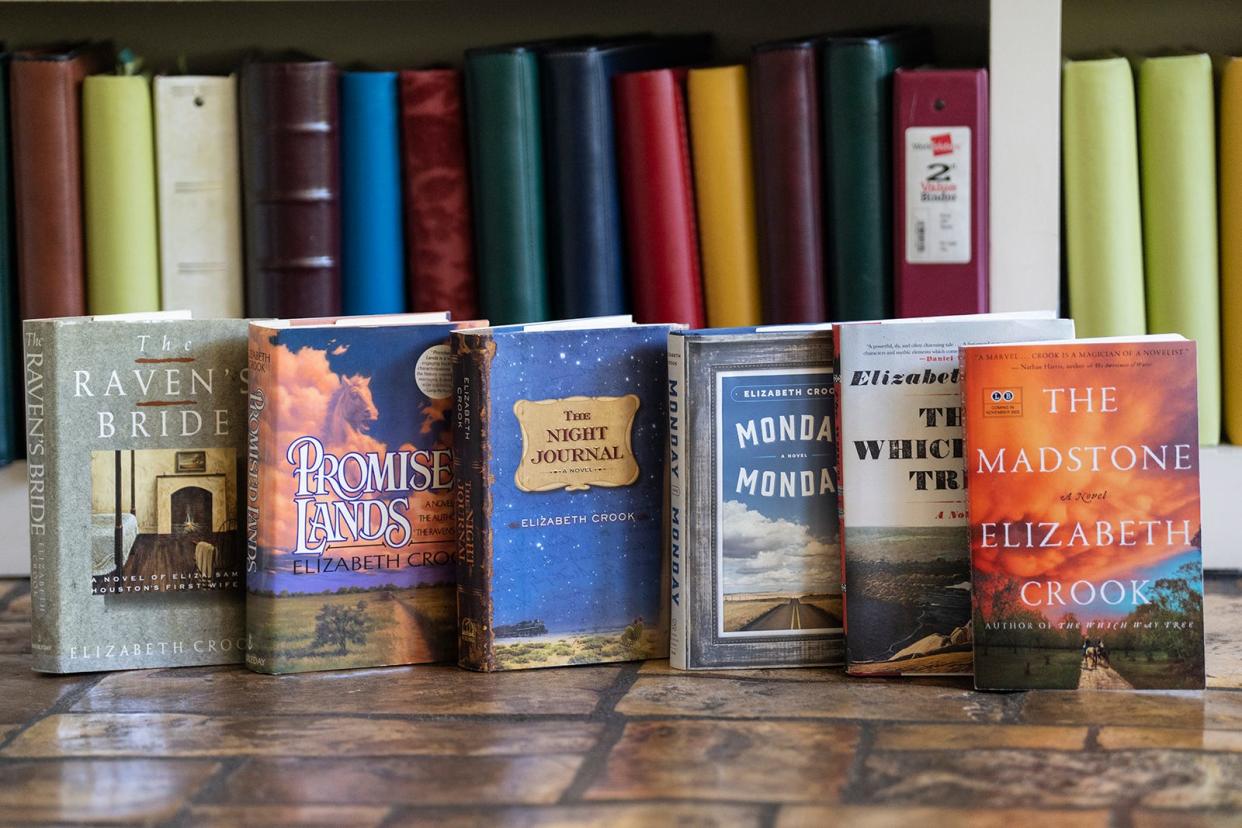
A historical novelist comes from a famous Texas family
Crook and her husband, Marc Lewis, who teaches medical problem solving at the University of Texas, live in a sprawling yet homey 1940s house set on a wooded piece of land just uphill from Shoal Creek.
Several spaces on the eastern side of the first floor are dedicated to Crook's inspirations, which include shelves of books, organized piles of books and papers, and photographs of her ancestors, along with carefully chosen art.
More: Six summer books to transport the reader to the Texas outdoors
Crook, 64, was born at Hermann Hospital in Houston.
"My grandfather said to my mother that if she waited to have me on his birthday, he'd pay all the doctor's bills," Crook jokes. "I'm named after my grandmother."
That would be Mary Elizabeth Butt, who was married to Howard Edward Butt Sr., son of H-E-B founder Florence Butt and CEO of the H-E-B Grocery Company.
Mary Elizabeth Butt was involved in mental health care for children and libraries; she won numerous awards for her statewide philanthropy.
"She was an absolute powerhouse," Crook says. "And yet so soft spoken. When she was appointed to the state mental health board, she visited every facility and looked at the terrible conditions. She began to agitate. She'd say: 'You can't treat people without dignity.' They wanted to get rid of her, so they offered her a spot on the University of Texas board. She said 'I want to finish the work I started.' She was a huge influence on me, but I would never be able to accomplish the kind of things she did."
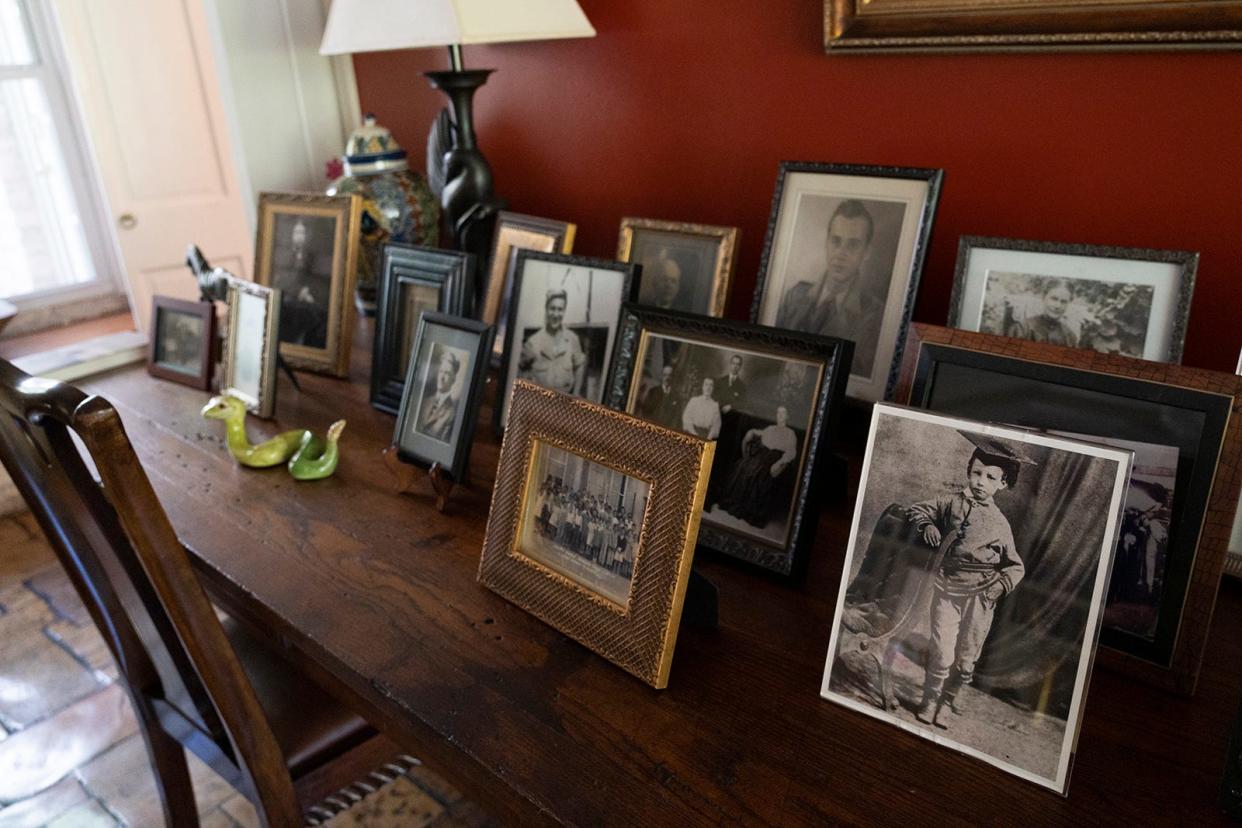
Mary Elizabeth Butt's daughter, Margaret Eleanor Butt Crook, is Elizabeth's mother. She runs the Eleanor Crook Foundation, which provides nutrition and other basic needs for people around the world.
Elizabeth's father, William Crook, was a Baptist minister who didn't grow up with wealth. He attended Baylor University on the G.I. Bill and later ran for Congress on a civil rights platform, but lost. He moved to San Marcos and became head of the Baptist academy there. President Lyndon Johnson appointed him the head of VISTA, now AmeriCorps Vista, the home-grown equivalent of the Peace Corps.
More: 10 gift books for people who love Texas culture
His next gig was as U.S. ambassador to Australia. As a youth, Elizabeth Crook lived there, in Washington, D.C., and in Texas. She grew up in a friendly San Marcos neighborhood and attended Laity Lodge youth camp in the Hill Country. Her lively, pet-filled house was a social hub, and her family frequently visited relatives in other parts of Texas.
She "wrote a lot of really wretched poetry as a child" and studied English and history in college.
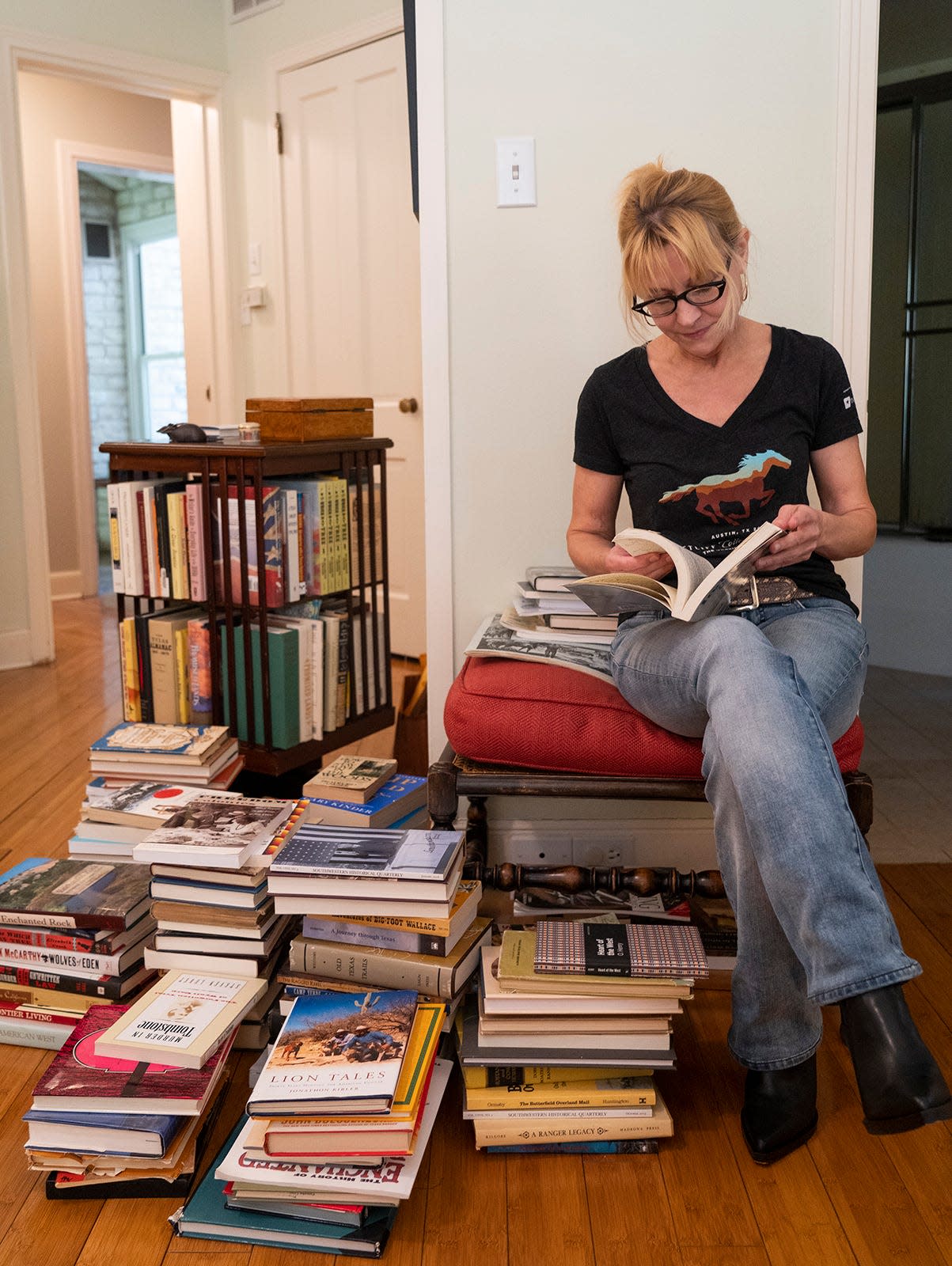
The life of this writer includes editor Jacqueline Kennedy Onassis
Crook's first novel, "The Raven's Bride," which tells of future Texas President Sam Houston's life before he left Tennessee, underwent many drafts and rewrites and suffered through numerous rejections. She signed her first contract with Texas Monthly Press, but before she delivered the manuscript, the company was sold to Houston-based Gulf Publishing, which did not publish fiction.
The manuscript next landed at Doubleday, where Crook's editor was none other than Jacqueline Kennedy Onassis, who also edited "Promised Lands," her second book. Crook has framed a sweet congratulatory note from Onassis, sent when her second book came out.
Her latest, "The Madstone," continues the coming-of-age story of Benjamin Shreve, introduced unforgettably in 2018 in "The Which Way Tree." Both novels tell suspenseful, action-packed stories of duty, crime, violence, love and survival in late 19th-century Texas.
Recently, Crook teamed up with Harrigan ("The Gates of the Alamo," "Big Wonderful Thing) on a screenplay of "The Which Way Tree." The Austin writers serve as producers on the movie project currently in development.
"Steve has been my closest friend for more than 30 years," Crook says. "He was the first editor of 'Raven's Bride.'"
More: Readers pitch their favorite Texas books
Like many authors, Crook is a slow, careful reader and a slow, careful writer.
"Plot is always hard," she says. "Once I get the characters together in one place, I let them go. Then I panic at the end of every chapter. I don't use an outline, which seems to me like connecting the dots. Without one, you just see what happens. Things you never planned. I travel with the characters along the way."
Although not always a fan of first-person narration in other novels, she finds it liberating if done right.
"When you have an omniscient narrator, you have to explain things," she says. For instance, in "The Which Way Tree," the character Benjamin "is not going to say how he made a fire. He's just going to say, 'We made a fire.' You still have to know everything, but you don't have to explain whether he had access to matches."
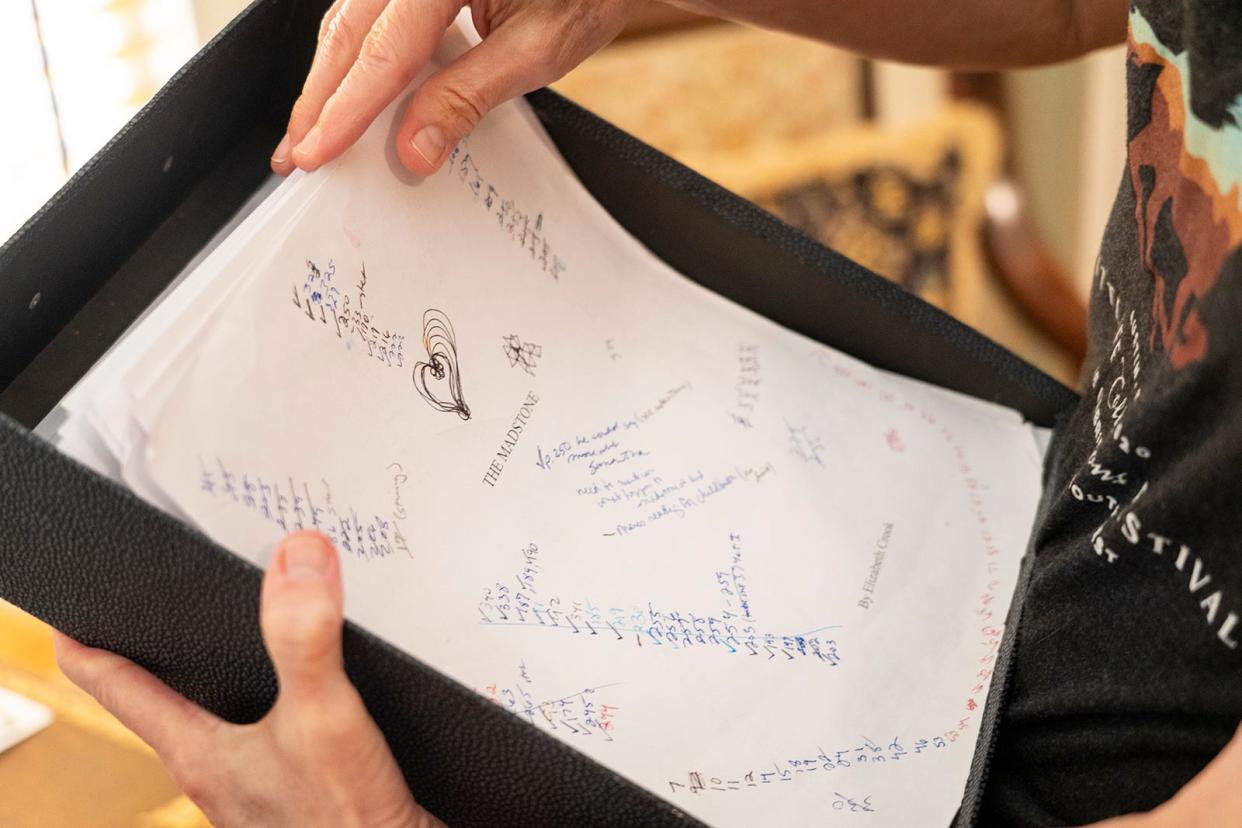
In "The Which Way Tree" and "The Madstone," Benjamin comes off as absolutely authentic. A primary inspiration for crafting the speaking style of a young man of the Hill Country in 1868 was "Now You Hear My Horn: The Journal of James Wilson Nichols, 1820-1887."
"You find a certain rhythm that works," Crook says. "And I write out loud. While I'm writing it, I'm hearing it. James was untaught. That's just the way he spoke."
Crook does prodigious research and stacks the books employed for each project around her office.
"I go down all these rabbit holes," she says. "A lot of it is not relevant. It becomes a matter of what to leave out."
Will she bring Benjamin back for a third novel?
"I don't know," she says. "I already miss him again."
Paging through the six Crook novels
One of the many tributes to Crook's skills arrived too late to reprint on the jacket of the first edition of "Promised Lands," but since it came from Larry McMurtry, the publisher raced to slap a sticker on the front that reads: "'Promised Lands' is a vivid, engaging book, the characterizations lively, the history convincingly managed. It deserves wide readership."
The same could be said of all six of Crook's novels. Here they are:
"The Raven's Bride" (1991, Doubleday): In 1829, future Texas President Sam Houston was married briefly to young Eliza Allen, who came from a leading Tennessee family. The abrupt end of their marriage caused a scandal and left behind a mystery that Crook unravels with a high degree of imagination while staying as close as possible to the admittedly ambiguous historical record.
"Promised Lands" (1994, Doubleday): In 1836, during the "Runaway Scrape," Texians and Tejanos fled the armies of Gen. Santa Anna. Crook tells the epic tale of the Texas Revolution through memorable characters, with a big chunk staged at the Goliad massacre. She shared with me a funny but all-too-familiar story about the first drafts of the book's cover, which depicted something like a Hollywood western rather than the flooded East Texas rivers and brushy South Texas plains of the novel.
"The Night Journal" (2006, Viking): Not everything is as it seems in this novel, which harks back to a 1890s journal by a pioneer woman. It becomes a point of dispute by two of her female descendants. Set partly in New Mexico, the story burrows into the spread of railroads, Harvey House hospitality outlets, and the 1857 Mountain Meadows Massacre in Utah, during which Mormons killed some 120 immigrants as part of the Utah War.
"Monday, Monday" (Farrar, Straus and Giroux, 2014): In contrast with Crook's first three novels, which focus on life in the Southwest during the 19th century, this one jumps ahead to the 1960s in Austin. The primary date — Aug. 1, 1966 — will alert the reader right away to the scene: On that hot day, Charles Whitman, armed with a sniper rifle high atop the University of Texas Tower, shot at anyone he could see. Crook personalizes the story through the lives of three students caught up in the tragedy.
"The Which Way Tree" (Little, Brown, 2018): Both this novel and "The Madstone" are told in the first person by Benjamin Shreve, but not addressed directly to the reader. In the first, he dictates a legal testament; in the sequel, he writes a long letter to a child he knew only briefly. In the first book Samantha "Sam" Shreve, Ben's half-sister, has vowed to track down a panther that disfigured her face and killed her mother. The adventure, mostly set in the Texas Hill Country, takes your breath away.
"The Madstone" (Little, Brown, 2023) For a few pages, I missed Sam from "The Which Way Tree." How could I not? She is a once-in-a-lifetime character. Yet resourceful Benjamin, always trying to do the right thing but caught up with all sorts of flawed characters, grows more and more compelling. Especially as he bonds with a woman on the run from her in-laws, a sadistic East Texas crime family that has not accepted the end of the Civil War. This is meant as the highest of compliments, but Benjamin reminds me at times of Travis in Fred Gipson's "Old Yeller," Papa in Bill Wittliff's "The Devil's Backbone" and Terrell in Harrigan's "The Gates of the Alamo."
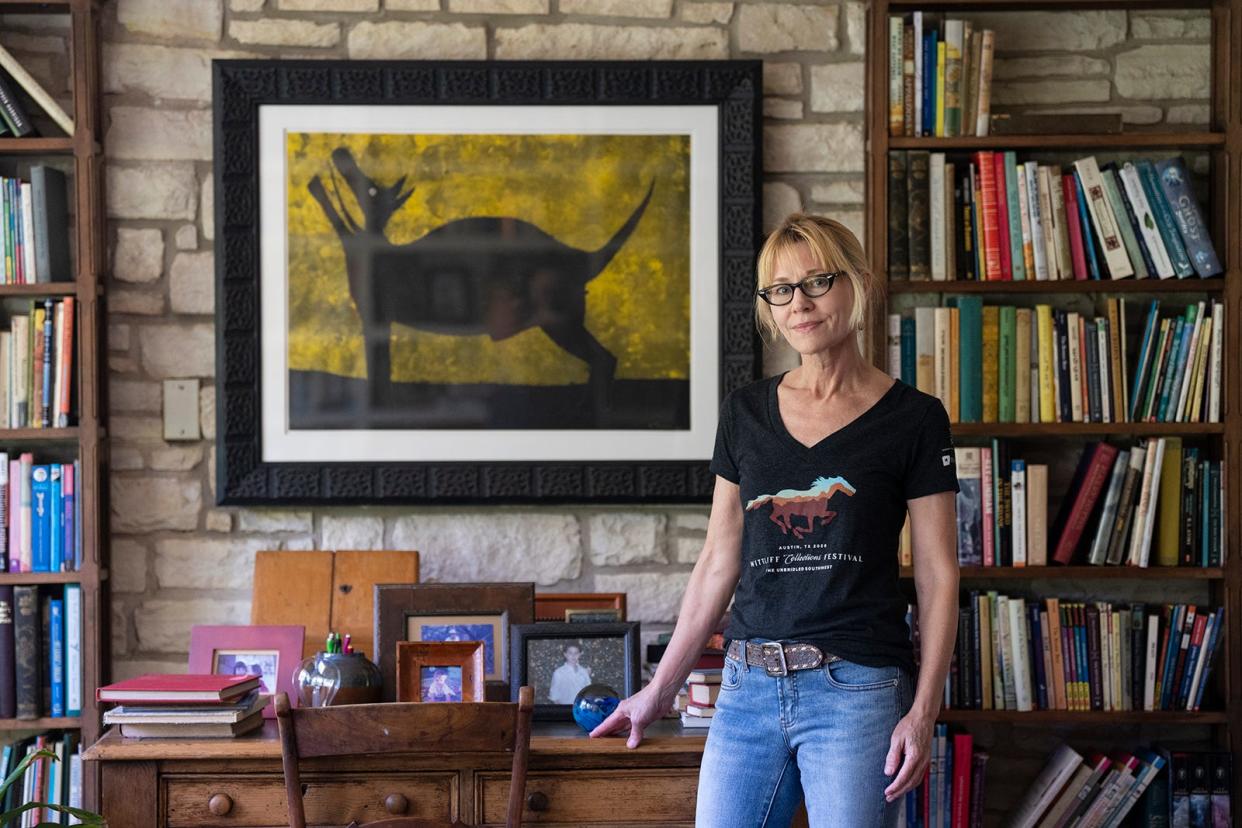
2023 Texas Book Festival
When: 11 a.m.-5 p.m. Nov. 11, 10 a.m. 5 p.m. Nov. 12
Where: Inside and around the Texas Capitol at 11th Street and Congress Avenue, with select additional venues
Cost: Most sessions and events are free to attend.
Information: www.texasbookfestival.org
This article originally appeared on Austin American-Statesman: Elizabeth Crook to receive Texas Writer Award at Texas Book Festival
